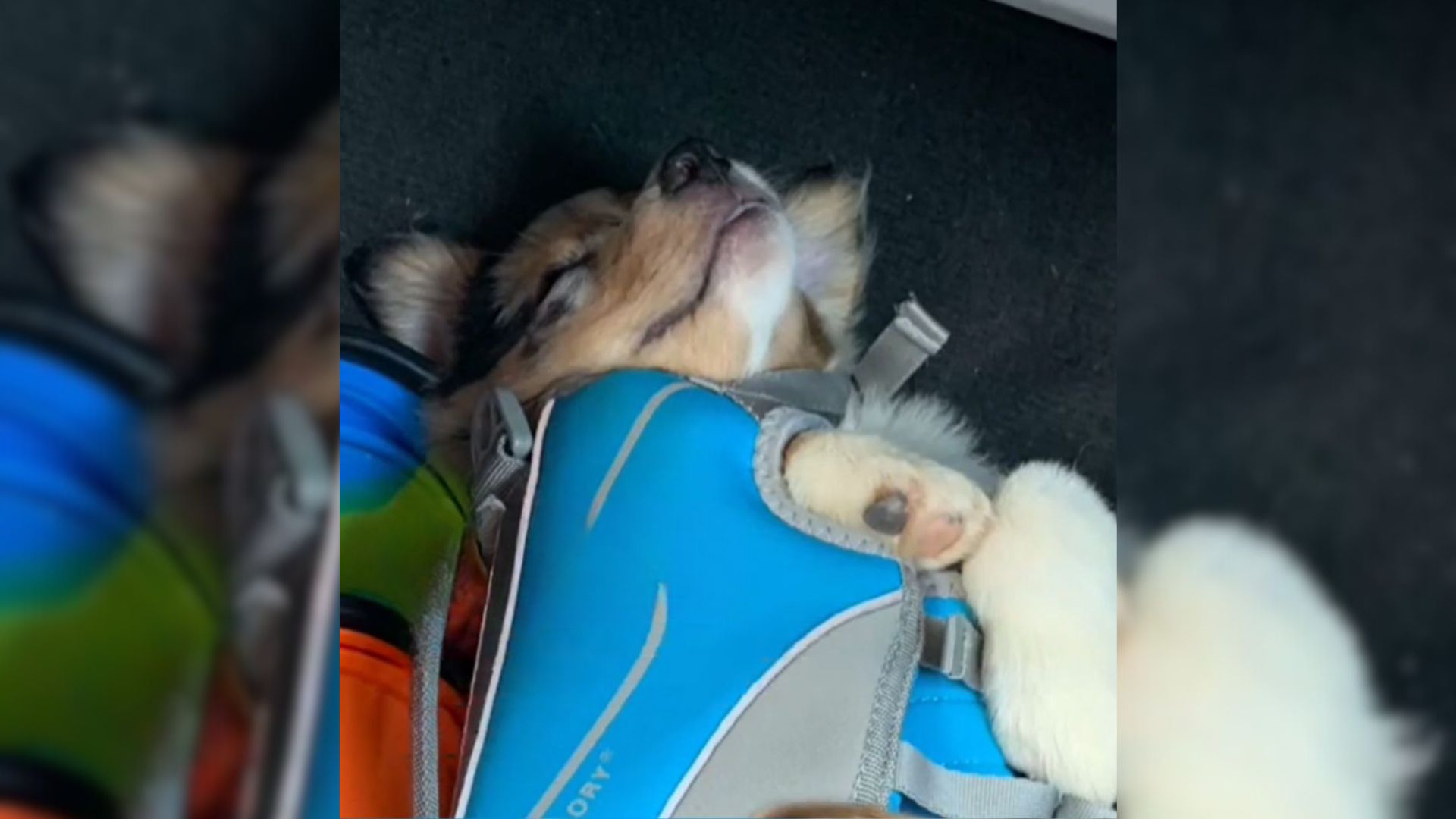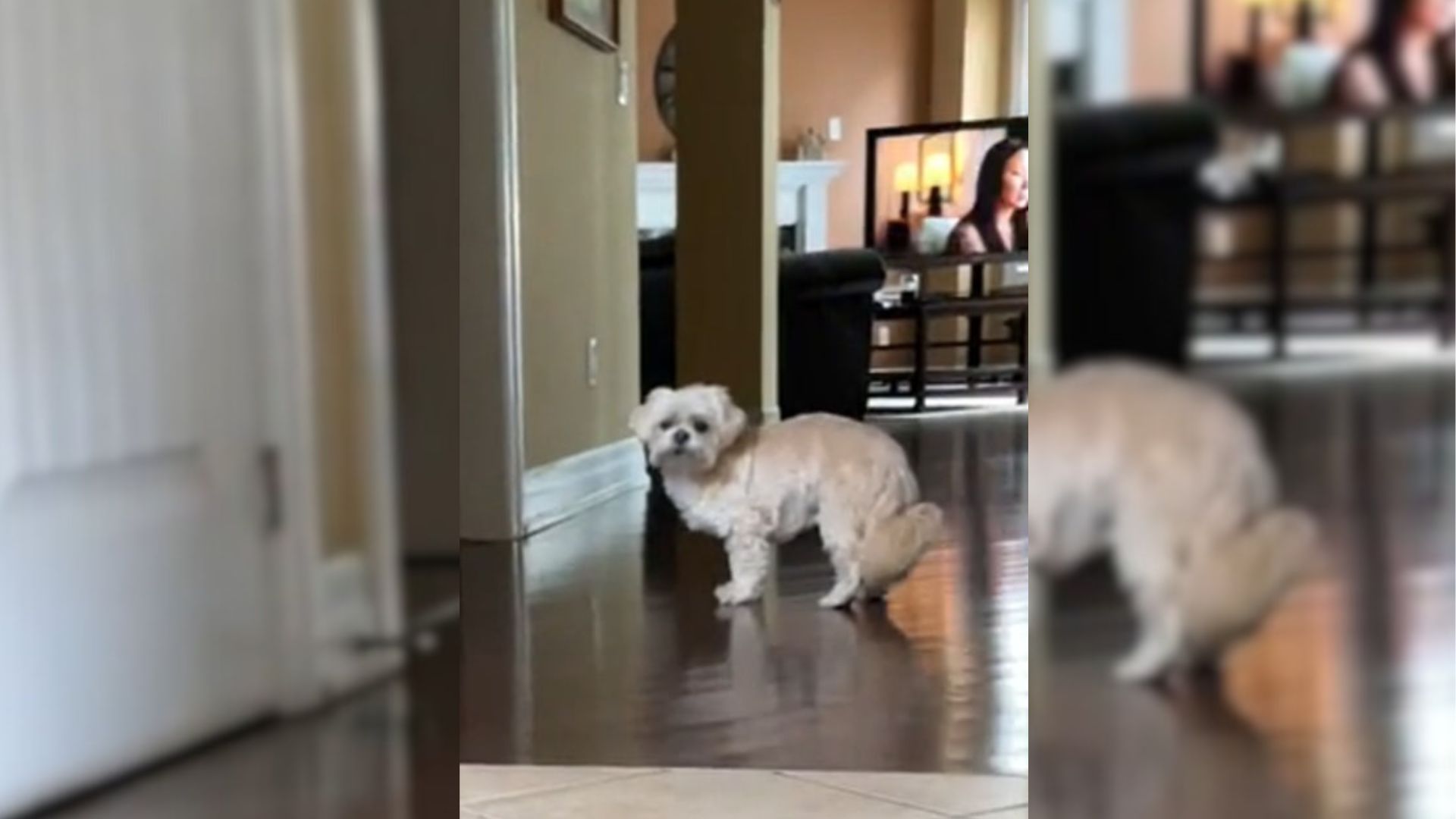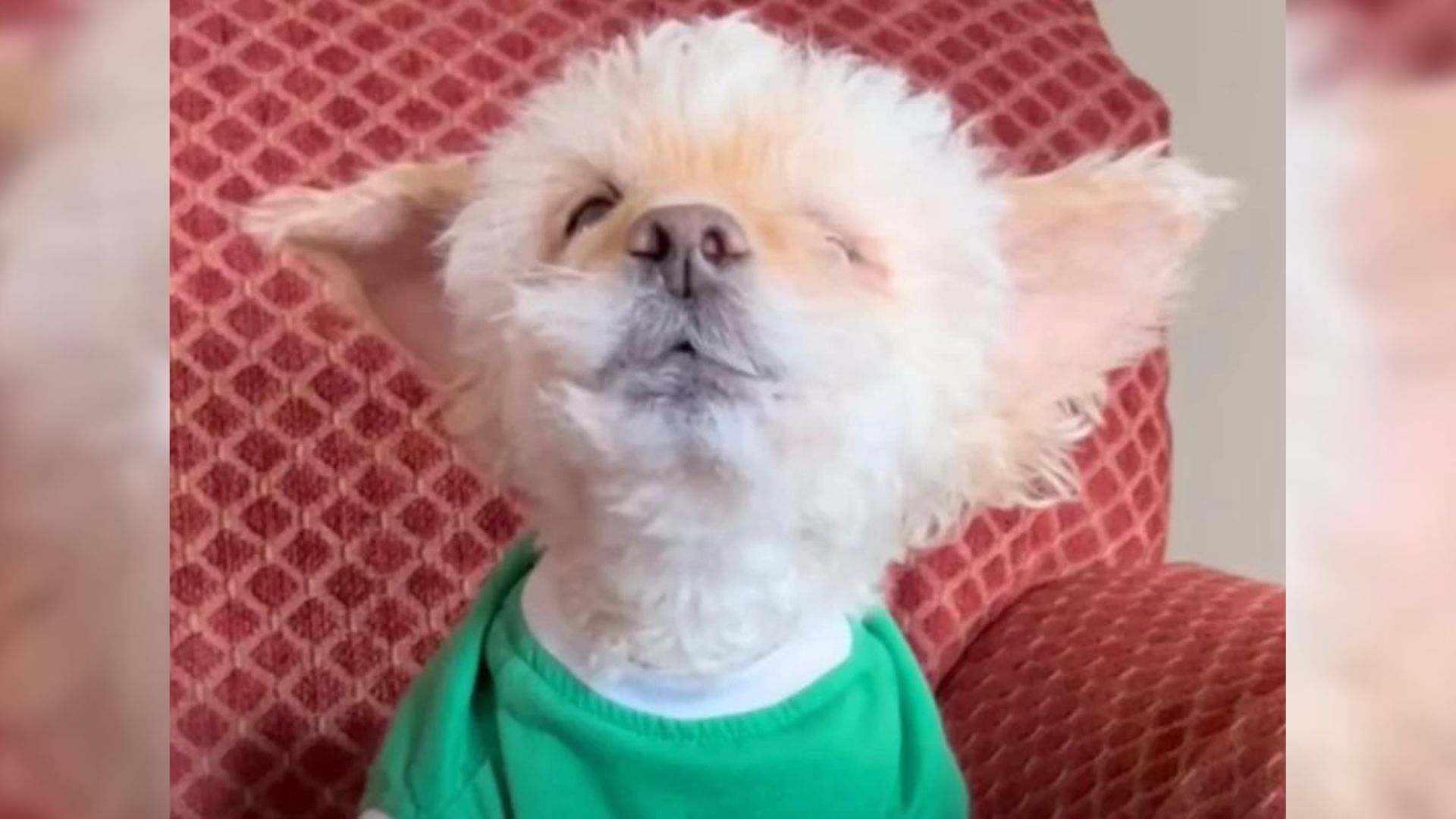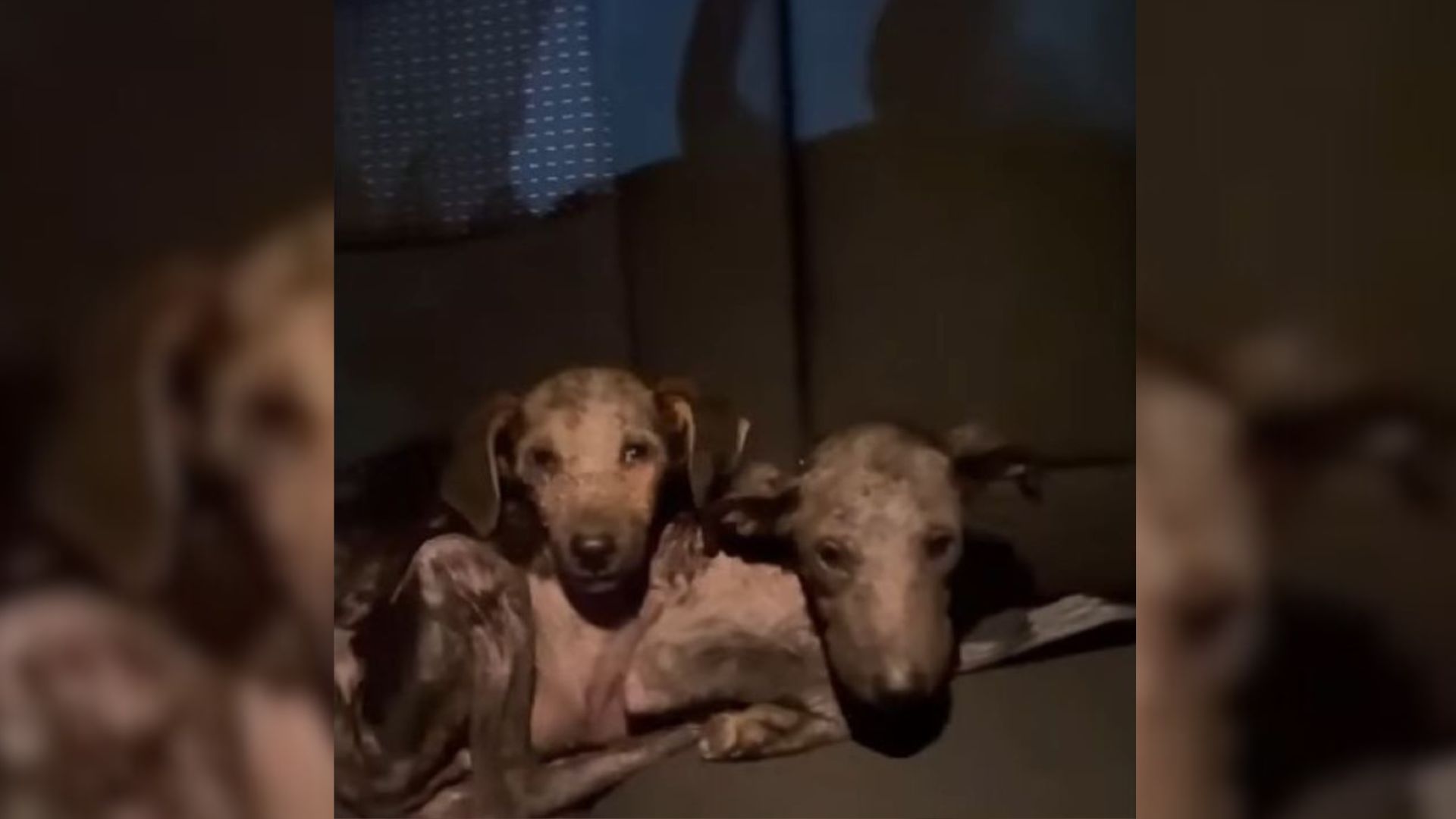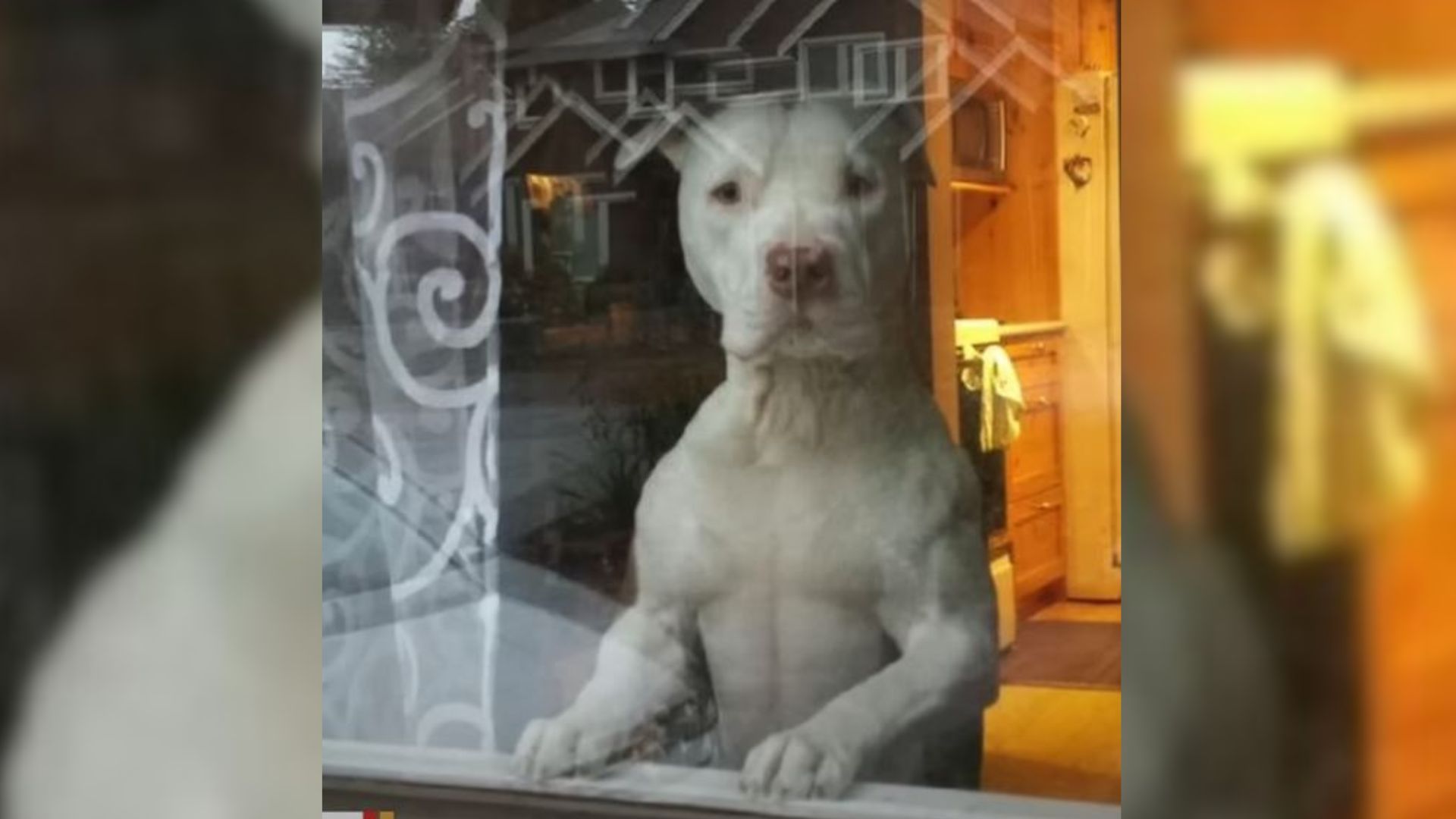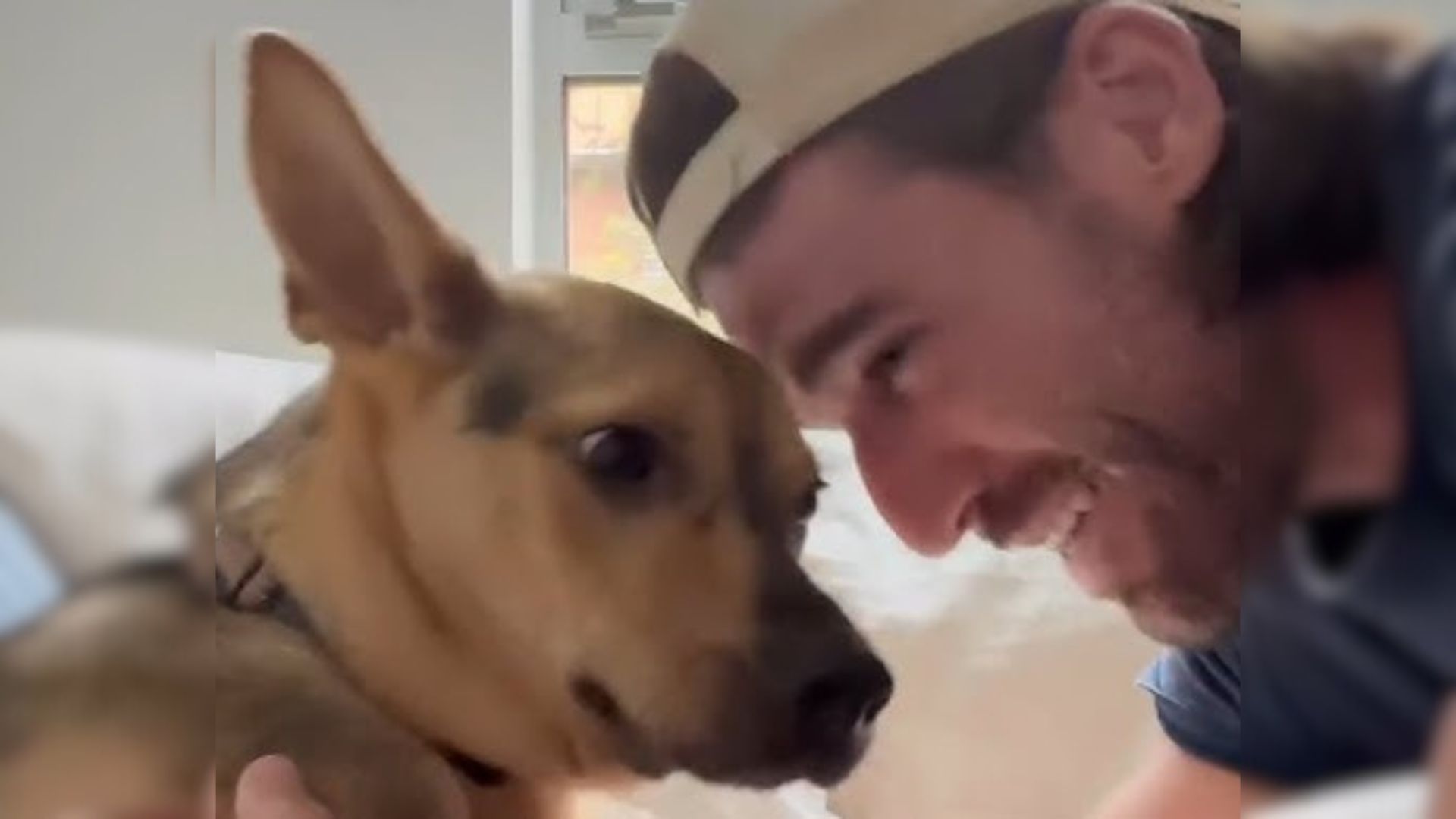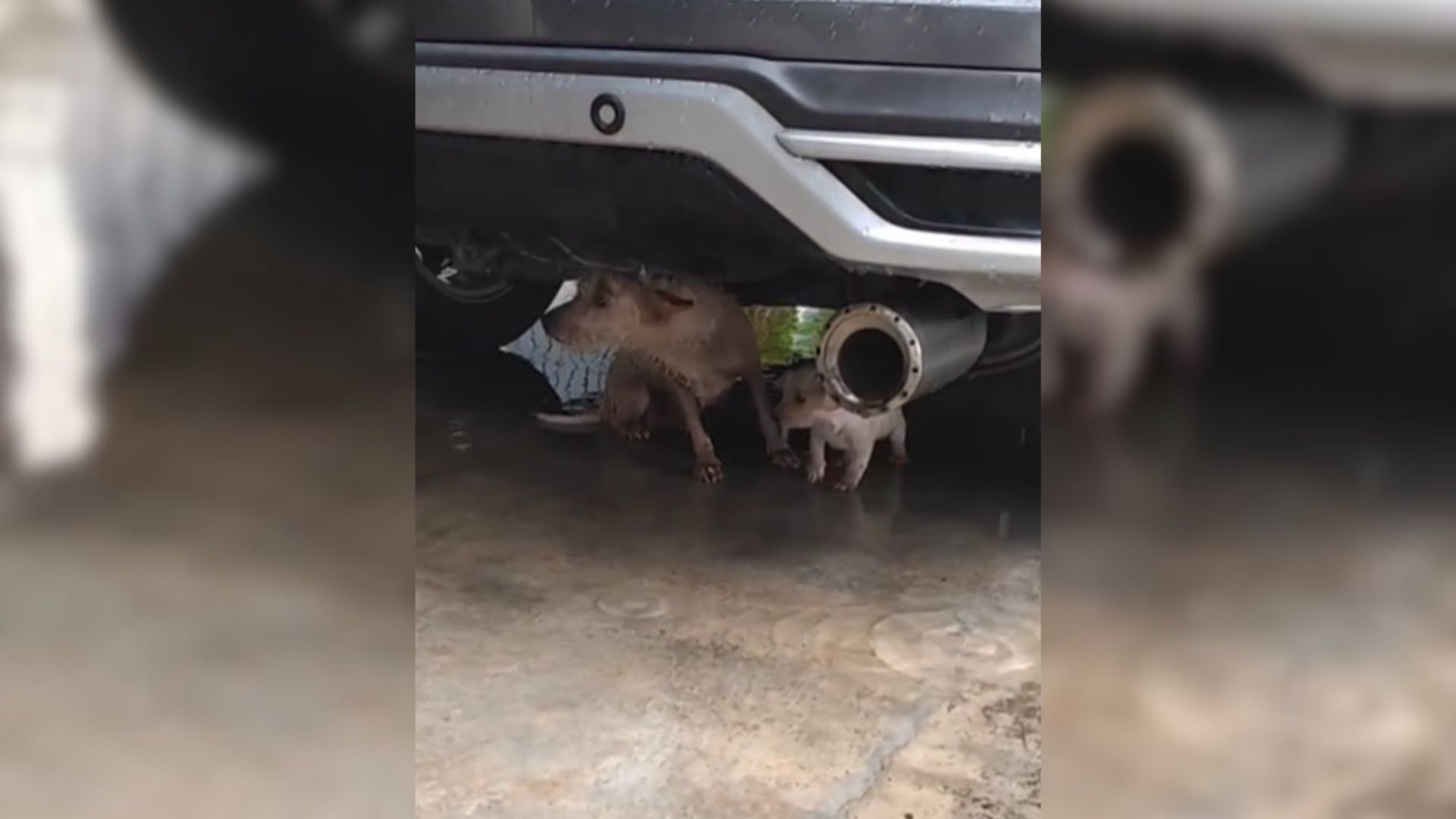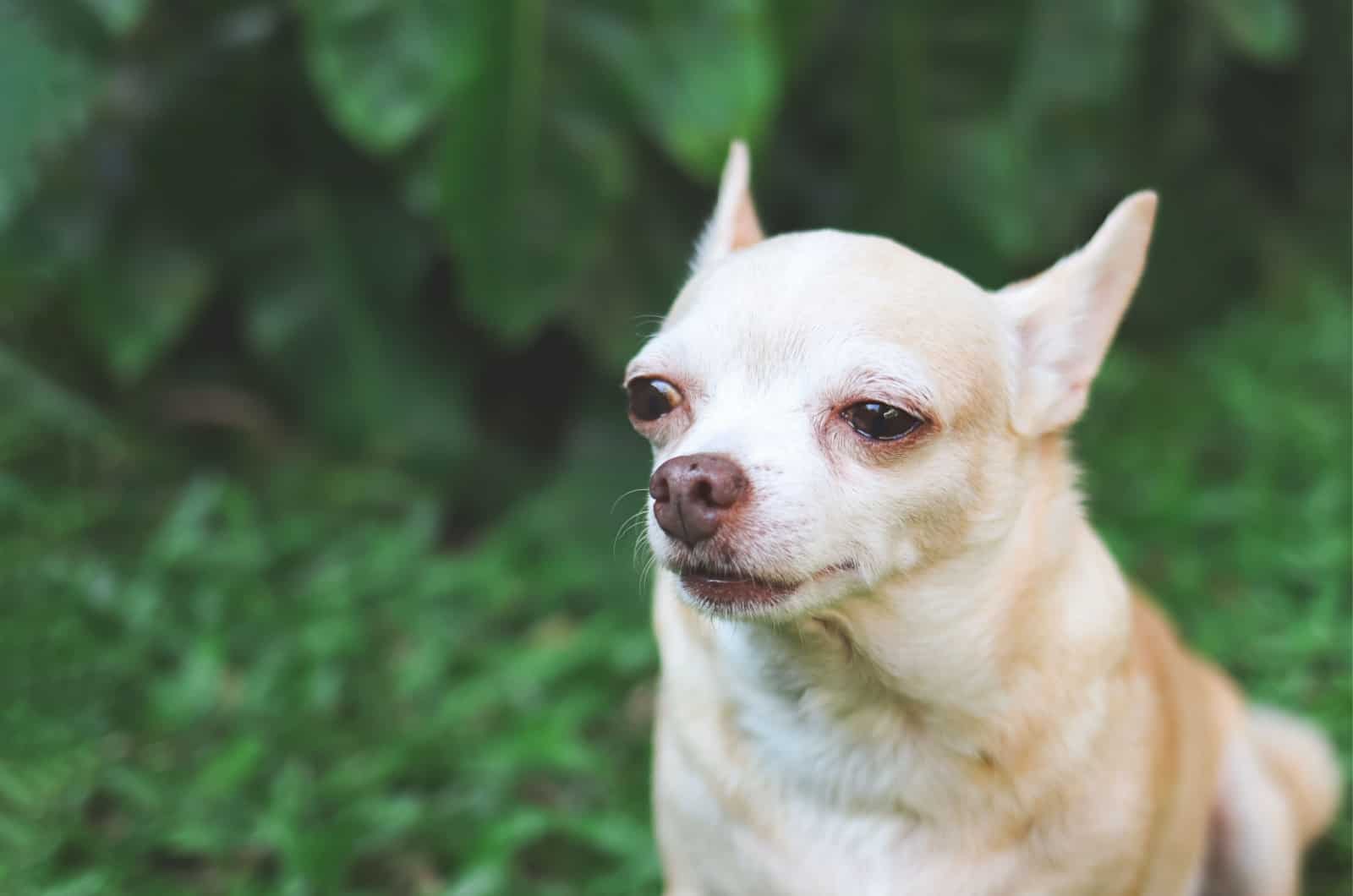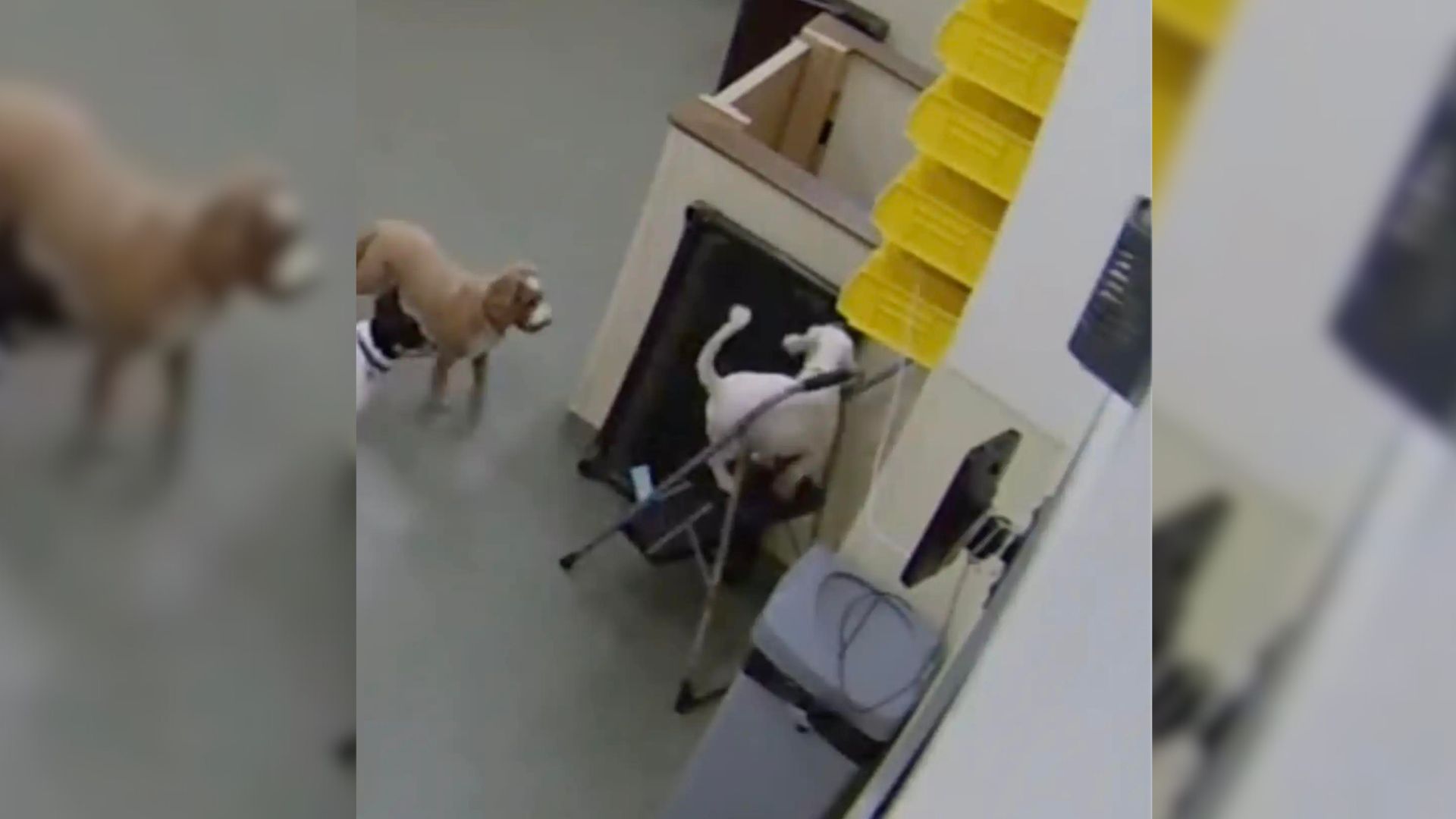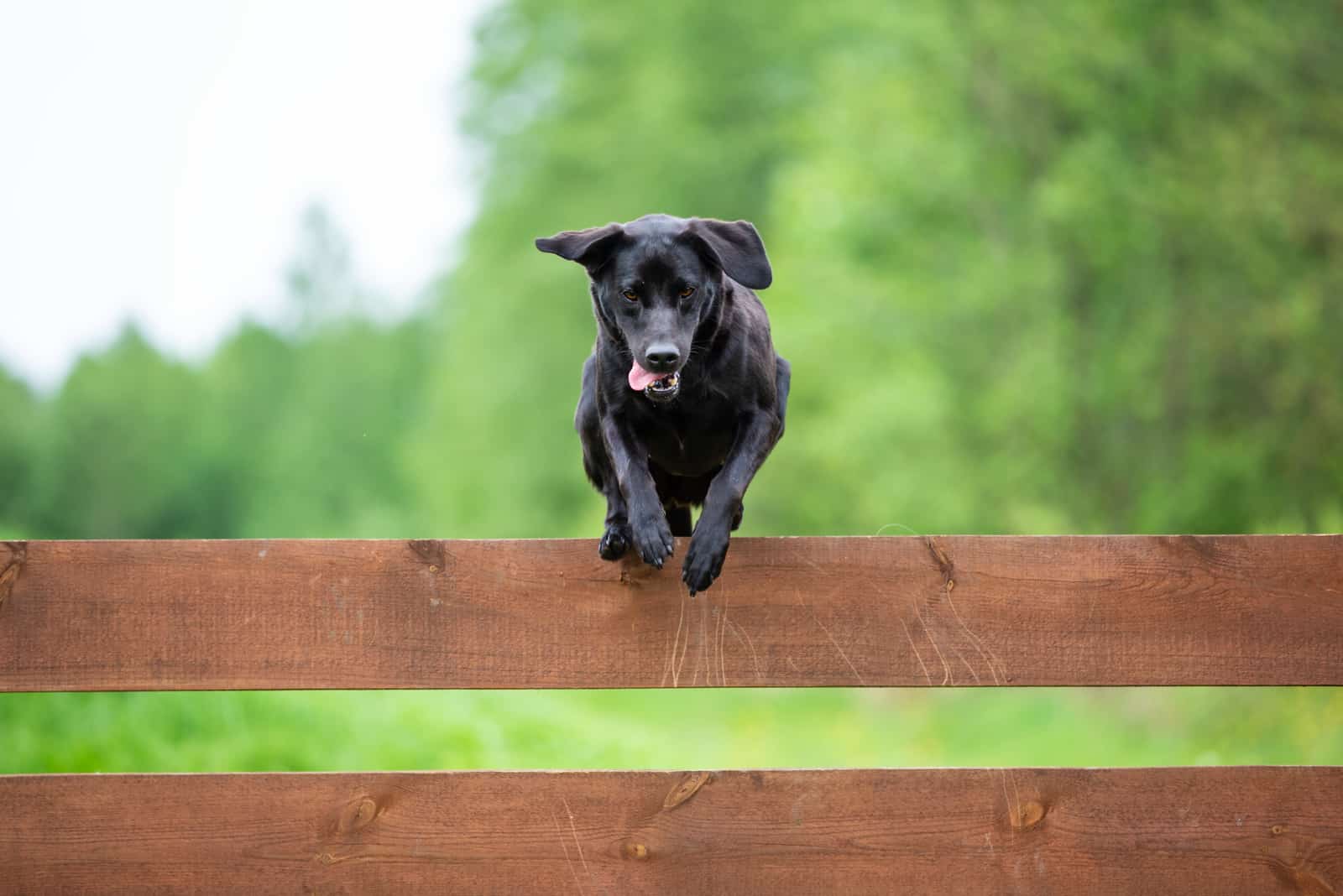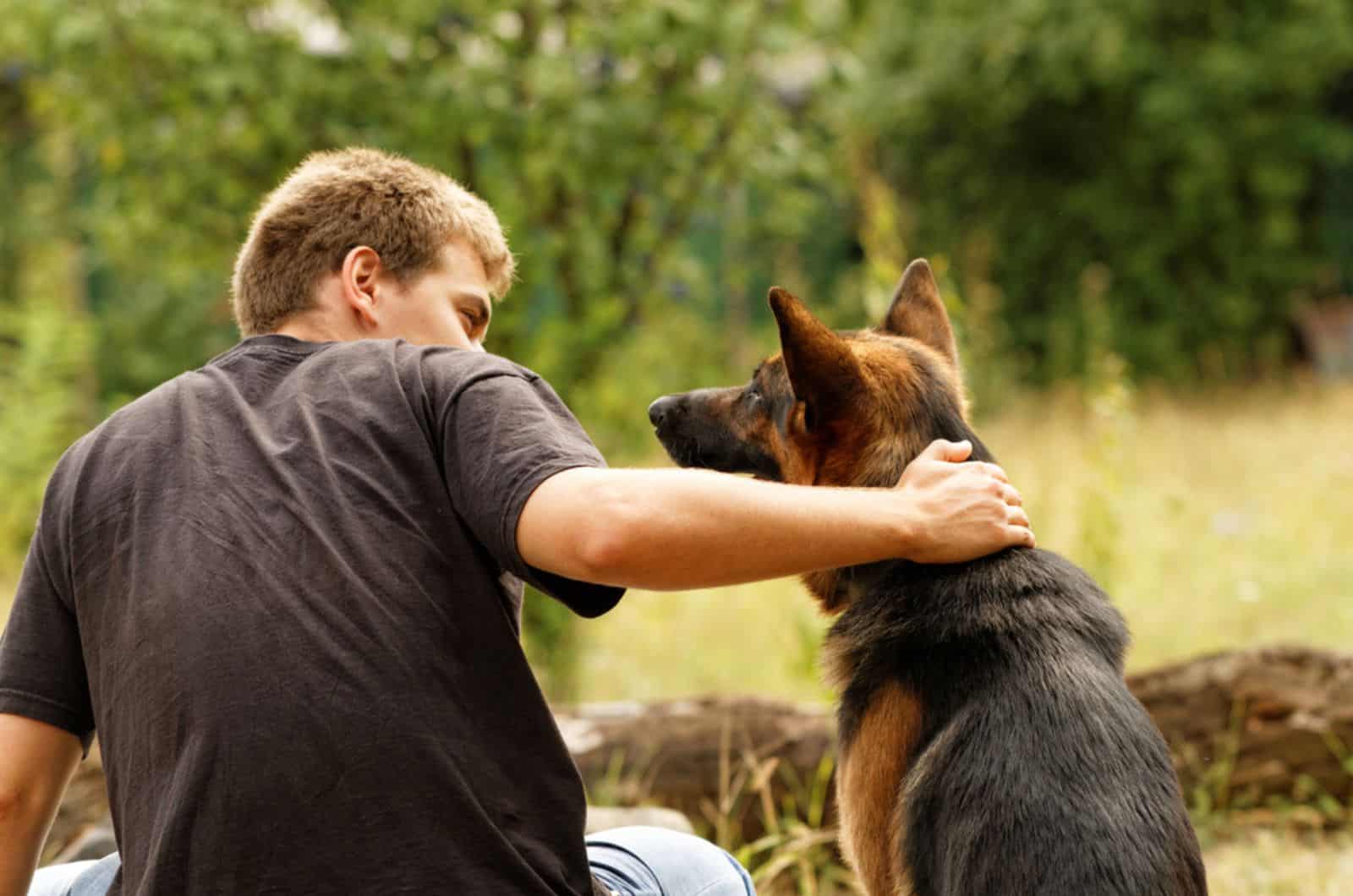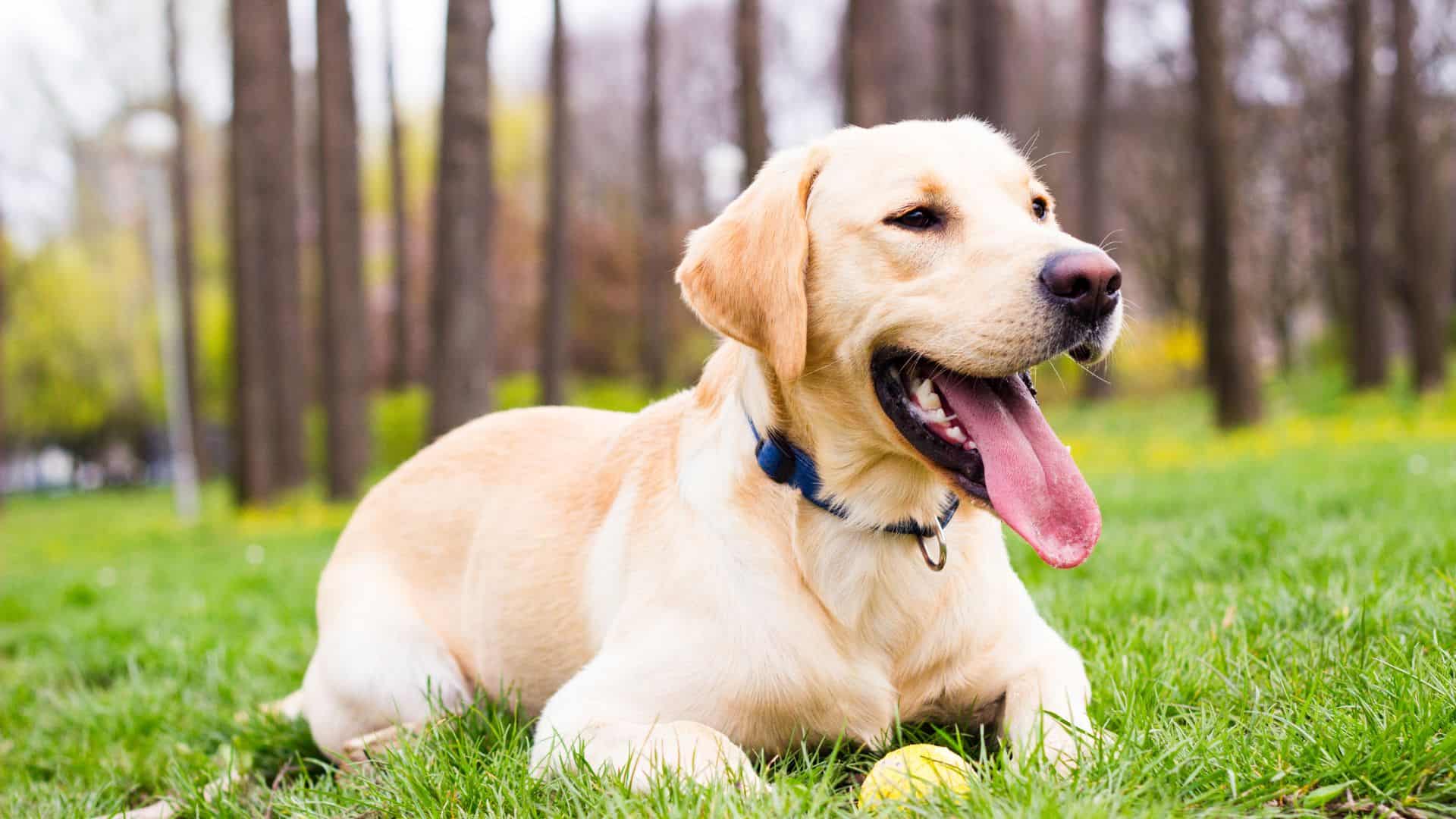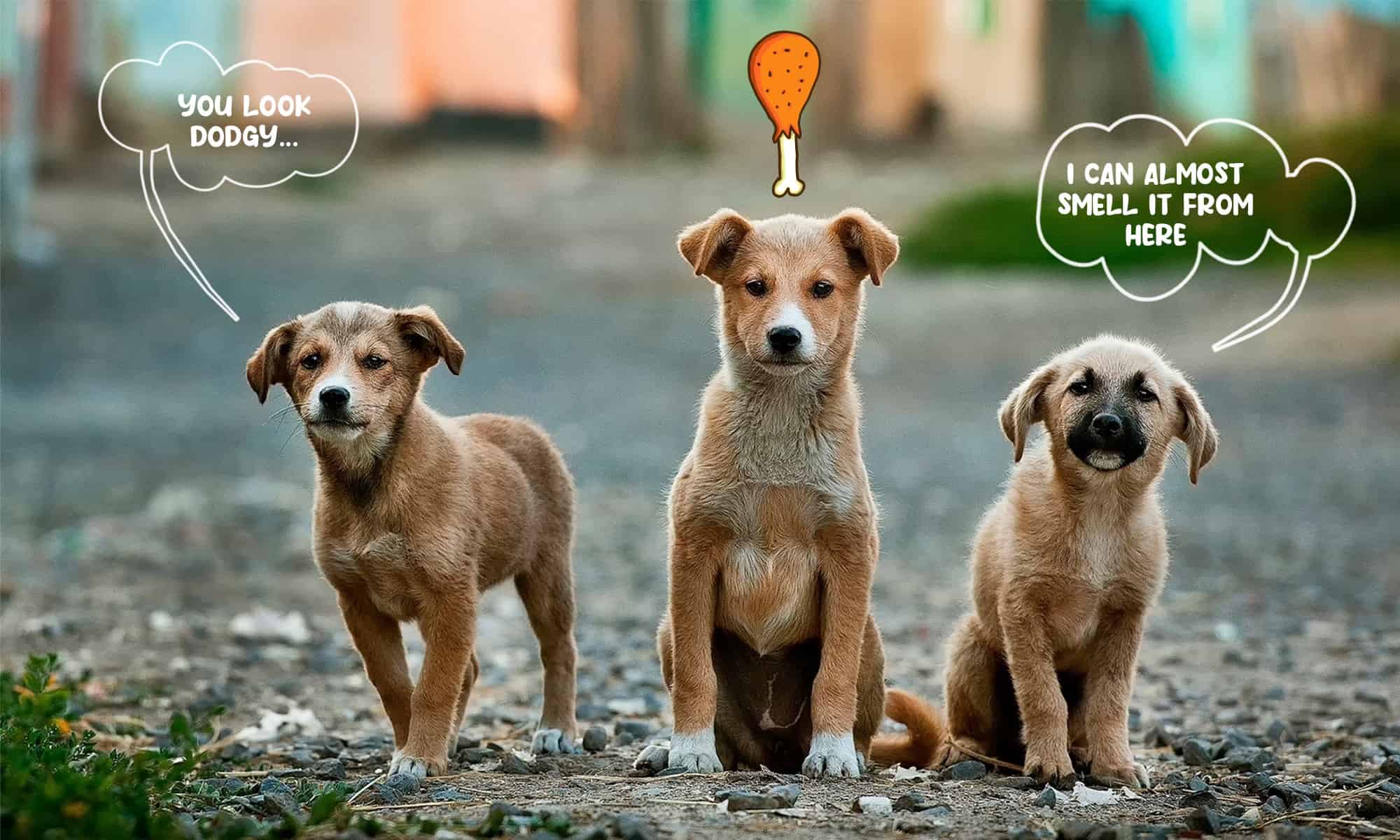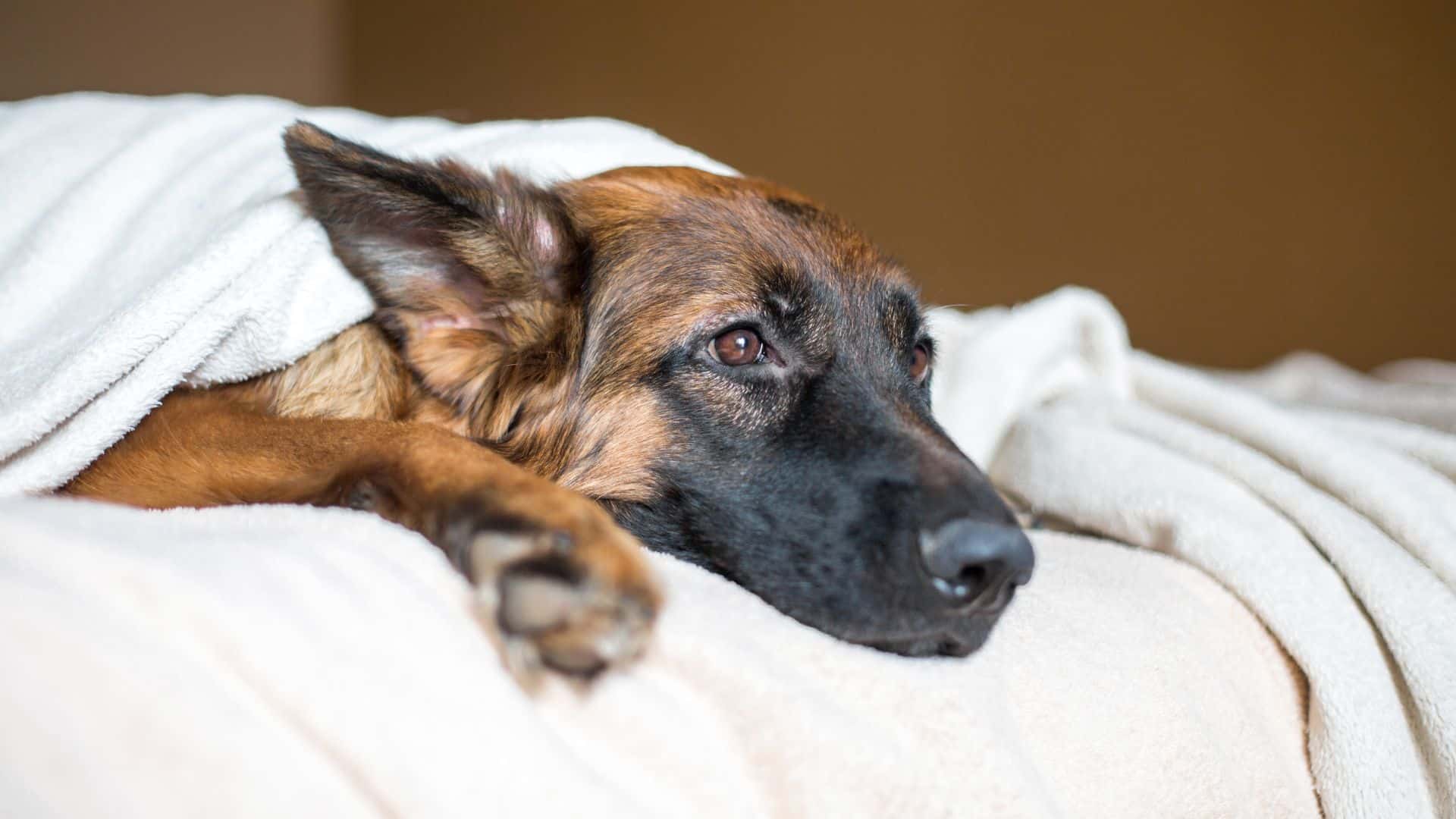When you become an owner of a new puppy, you want to take the best care of him possible. We all want to ensure our furry friends are happy and healthy – and, of course, well-fed.
The problem is, we have a soft spot for puppy dog eyes – and our dogs seem to know it. They will stare right into our souls whenever they feel like another treat – and this can end up being quite often.
Not to mention the times our dogs scarf down any tiny bits of food we’ve placed in their bowl or scavenge through our trash cans!
This behavior has made me think that my puppy is always hungry, no matter how much I feed him. This ended up being a false alarm, as there are more reasons why our dogs seem to ask for food all the time, and the culprit isn’t always hunger.
This article is for you if you, too, have been baffled by the “My puppy is always hungry!” realization. We have gathered a list of the many reasons our dogs might be asking us for food. You’ll be surprised to find out that you might not be dealing with a hungry puppy after all.
Here’s what we’ve found:
Why Is My Puppy Always Hungry?
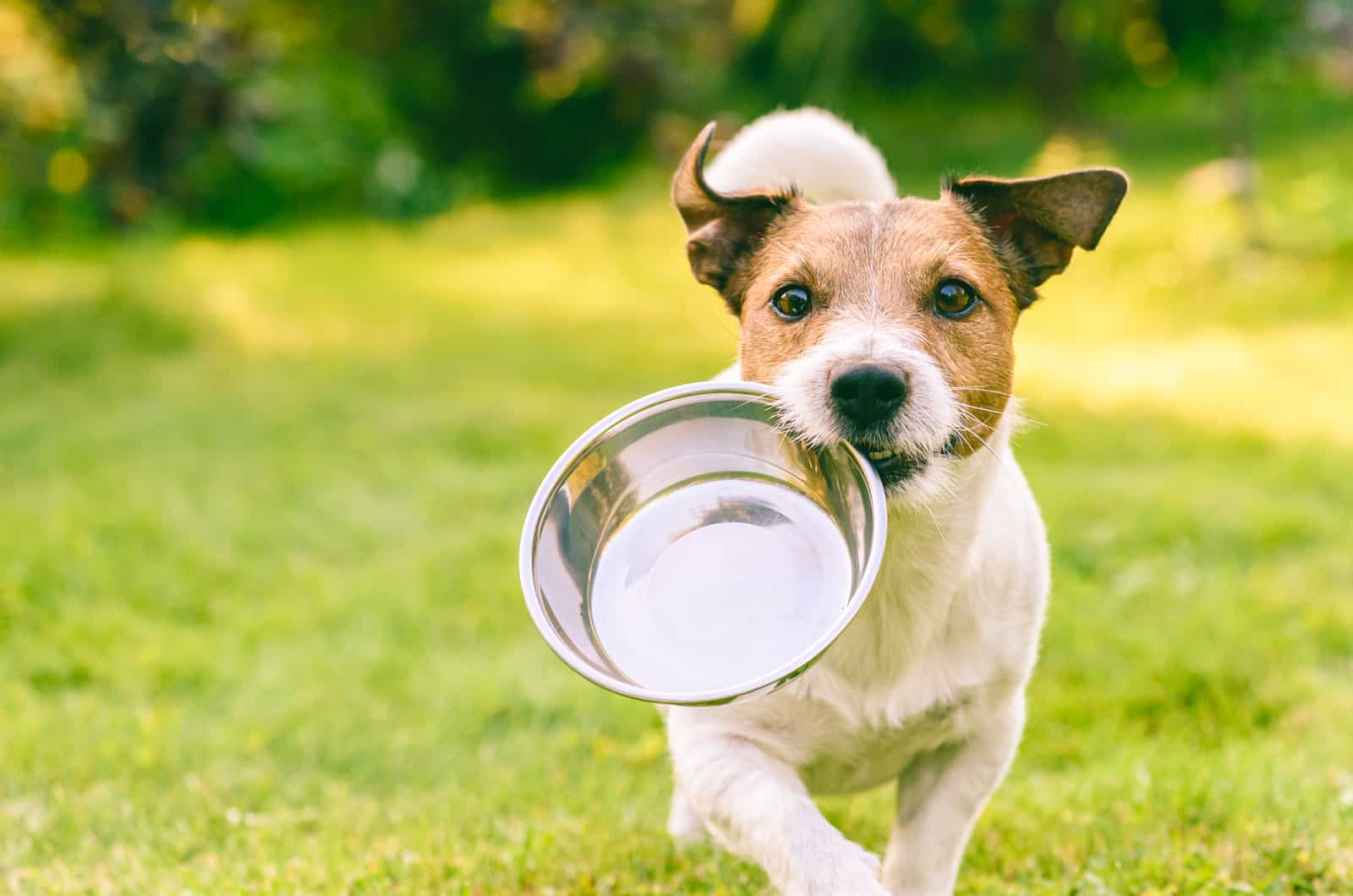
My puppy is always hungry is a sentence most veterinarians hear all the time. Puppies of all dog breeds seem to have an increased appetite and always behave as if they haven’t had enough food.
But what about when you have the same problem with an adult dog or even a senior one? And how can you know if you’re giving your puppy the right amount of dog food?
If you’re thinking: “My puppy is always hungry – why is this happening?” here are some of the possible reasons behind this behavior:
Adapting to a Schedule
If you have a new puppy that always seems hungry, chances are you’re feeding him at a different schedule than the breeder.
When you take a puppy into his new forever home, you’re making huge changes in his life overnight. This leaves them not just having to adjust to a new living environment, but their body might also require some time to adjust.
Newborn puppies have a feeding source available right there next to them, in the shape of their mother. Most breeders don’t entirely switch their puppies to dry food until they go to their new homes, which is why this is such a shock to their digestive tract.
Suddenly, your puppy is going from a constant supply of food to eating only two to four times a day. This is a huge change for him, and you have to train him that he’ll get food according to a schedule.
Over time, your puppy should stop begging you for food all the time, and he’ll learn that he’ll get it at a specific time and not whenever he asks.
Instincts
If you’re thinking: “My puppy is always hungry, no matter how much he eats,” chances are that this is because of his instincts.
In the wild, dogs are opportunistic eaters. They can spend days without any access to food. As a result, when they do manage to find food, they’ll eat as much as they can. This is the same reason many dogs express food aggression. They won’t share their food, as they require it to survive.
Many wild dogs and wolves will scavenge for food and bury any leftovers so they can have them later. Does that sound familiar? If your dog is constantly trying to dig in the trash can, he is simply following his survival instincts.
Regular feeding can help teach them that they won’t starve if they don’t eat all the time. However, this won’t help a dog’s insatiable appetite, and you have to be the one to control how much they eat and when.
Survival Mode
If you have an adult dog that is always hungry, chances are you adopted him when he was older than a few months. A dog’s food-seeking behavior tends to be due to his upbringing.
If your puppy has spent some time as a stray, they’ve likely learned that they have to eat a lot to survive. Unfortunately, this type of behavior is challenging to stop, but if you stick to a feeding schedule, you can teach him that he won’t stay hungry.
You’ve Reinforced This Behavior
Have you succumbed to the puppy eyes your dog has been giving you? If you’ve given him table scraps when he begged you for some, then you’re partially to blame for this bad behavior.
If your dog realizes he’ll get food when he begs for it, he’ll keep on doing this, even when that annoys you. This is why you should never give in to your dog’s pleas – no matter how adorable he is.
A good idea is to lock your dog in another room when you’re eating. This will stop him from wanting to beg, and it will keep you from giving him ‘just a bite.’ You have to teach him that begging doesn’t achieve anything.
Health Problems
Unfortunately, sometimes the answer to your puppy’s never-ending hunger is health problems. If you’ve noticed: “My dog is always hungry and losing weight,” he might be having problems with parasites, or there might be medical causes behind it.
• Parasites are especially common in puppies. In fact, some puppies are even born with a parasitic infection they inherit from their mothers.
• Worms are the most common parasites in dogs. They will stick onto the intestinal walls and absorb all the nutrients from the food your dog eats. This can lead to an increased appetite and malnutrition.
• Cushing’s disease or hyperadrenocorticism is another health issue that can cause an increased appetite. If a dog has this disease, his body will produce too much glucocorticoid, a stress-regulating hormone. Too much glucocorticoid causes your dog to be hungry all the time.
• Diabetes can affect dogs of any age. Dogs with diabetes will lack insulin, which normally helps glucose get into the blood cells. As a result, your pup isn’t getting enough nutrients.
• Hyperthyroidism is another reason your dog might be eating a lot without any weight gain. This condition occurs when the thyroid gland produces too much thyroid hormone, making your dog hungry all the time.
If you’re wondering: “My puppy is always hungry, but why isn’t he gaining any weight?” it would be a good idea to take him to the local vet, who might be able to rule out any of these health concerns.
Keep in mind that young puppies have a much faster metabolism than older dogs. They can eat a lot without weight gain. However, if you notice they are becoming underweight, this is a red flag.
How Much Food Does My Puppy Need?
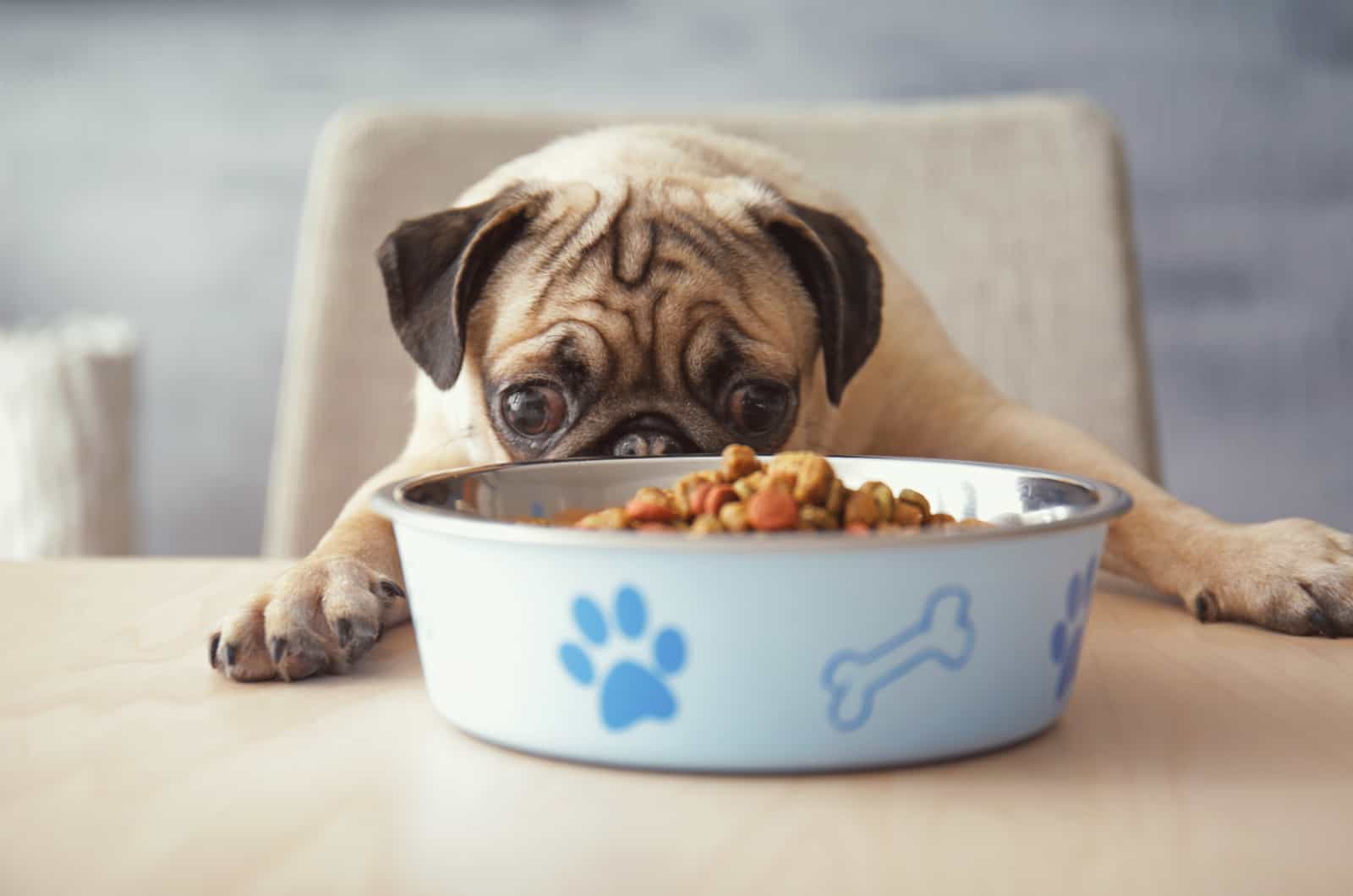
While you may worry that your puppy is hungry all the time, how can you know if you’re giving him enough food? Understanding a dog’s nutritional needs is very important when creating a feeding schedule, as it can tell you when is the time for the next meal.
Overfeeding is just as bad for your puppy’s health as underfeeding, and you need to help him create good eating habits. Many dog owners think nothing bad will happen if they give their puppy one more treat, but this couldn’t be further from the truth.
The smartest thing would be to talk to your vet about the right amount of food your puppy requires. Most of the time, this will depend on things such as dog breed and size and his activity levels. Large breeds that are active will require more calories than small lap dogs.
Here are the most important facts all pet parents should know:
How Many Mealtimes Per Day?
If you have a small puppy, be prepared to feed him about four times a day. Puppies require lots of small meals as their metabolism is faster, which is also the reason puppies will want to poop much more often than adult dogs.
As he grows older or becomes overweight, this is a sign that he is overeating and that it’s time to cut down a meal. An older puppy should be fed 2 to 3 times a day.
Adult dogs should eat no more than twice a day – unless they are working dogs with higher activity levels. Active dogs require more small meals a day as this can provide them with enough energy to go through their day.
Food Needs
The amount of dog food required will depend mostly on the size of your dog. This should make sense. A large dog should eat more than small breeds.
However, the main indicator of how much food a puppy should eat is his weight.
For example, a 10-pound German Shepherd puppy will require 2 cups of food daily (not per meal!), and a 40-pound Labrador puppy will still require 5 cups of puppy food – even though an adult German Shepherd will likely require more food than an adult Labrador.
On the other hand, a small, 5-pound Chihuahua puppy will need no more than one cup of food per day. A 10-pound Bulldog puppy will also require 2 cups of food, just like a 10-pound German Shepherd pup.
This is because a growing puppy requires a good amount of food, no matter how large he’ll grow up to be. However, this can change in adult dogs, as you’ll notice his behavior and how active he is throughout the day.
The daily calorie intake will depend on the dog’s activity levels. A working dog cannot eat the same food as a dog who’s being kept as a family pet. They will require more calories and high-quality dog food without any fillers.
Fillers can lead to obesity as they contain empty calories that won’t do much for a hungry dog. They’ll make him feel full, but won’t provide him with any energy, so your dog will end up feeling hungry again in a matter of hours.
Keep in mind that puppies should eat wet food until they are old enough to chew on a kibble. For large dogs, this is usually when they reach 10 weeks of age. Smaller dog breeds have smaller teeth, which is why they might not be prepared for dry food until they are at least 14 weeks old.
How Do I Know My Puppy Is Eating Enough?
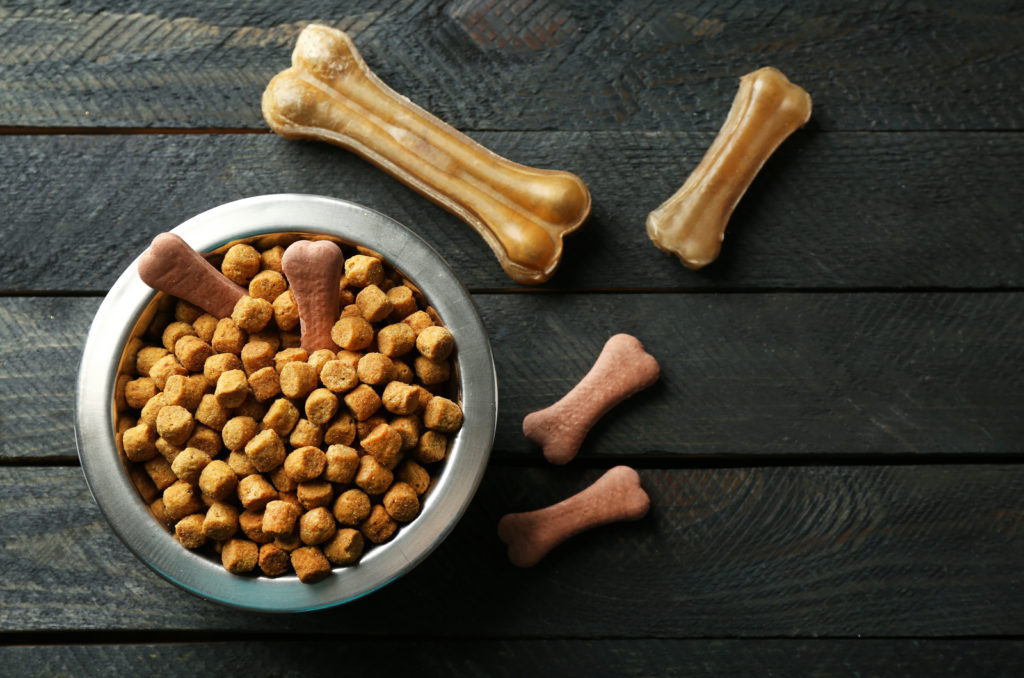
When I was still an inexperienced dog owner, I noticed that my puppy was always hungry, but I didn’t know whether he had bad habits when it comes to eating or if I wasn’t feeding him enough.
Young puppies especially can have a bloated tummy, which can make us think they are overweight, even if they’re not eating enough.
Fortunately, there are ways to notice whether your puppy is underweight or overweight. Here are a few questions you should ask yourself when looking at your pup:
1.Can I easily see his ribs?
2. Can I easily feel his ribs?
3. When I look at my dog from above, do I see his waistline?
4. Does my puppy’s abdomen sag when looking from the side?
The answers to these questions will tell you everything you need to know. We’ll elaborate:
• If you can see your puppy’s ribs, this is a clear sign that you’re not feeding him enough. Don’t go overboard or give him human food. Just increase the amount of puppy food you’re already giving him
• If you can easily feel your pup’s ribs, it might be a good idea to give him a bit more food every day. However, if he has a fine layer of fat over his ribs, this means you’re doing fine.
• If your puppy has a clear waistline when looking from above, this means he is perfectly healthy. Underfed puppies have a too slender waist, while overfed ones tend to not have a clear waistline at all.
• If a puppy has a saggy gut, they are probably a bit overweight. This alone shouldn’t be a cause for concern, though. Most puppies, just like babies, have a little bit of tummy fat. However, you might want to lower the amount of food you’re giving them by just a bit.
•If your puppy doesn’t have a waist and has a really saggy tummy, he is venturing into obesity, and you should lower the amount of puppy food you’re giving him. If you think your puppy is really overweight, you might even want to take him to the vet.
Of course, all puppies are different, and some dog breeds will always look chubbier than others. However, these guidelines are a general rule of thumb that can help you determine whether your dog is eating too much or too little.
Bad Habits
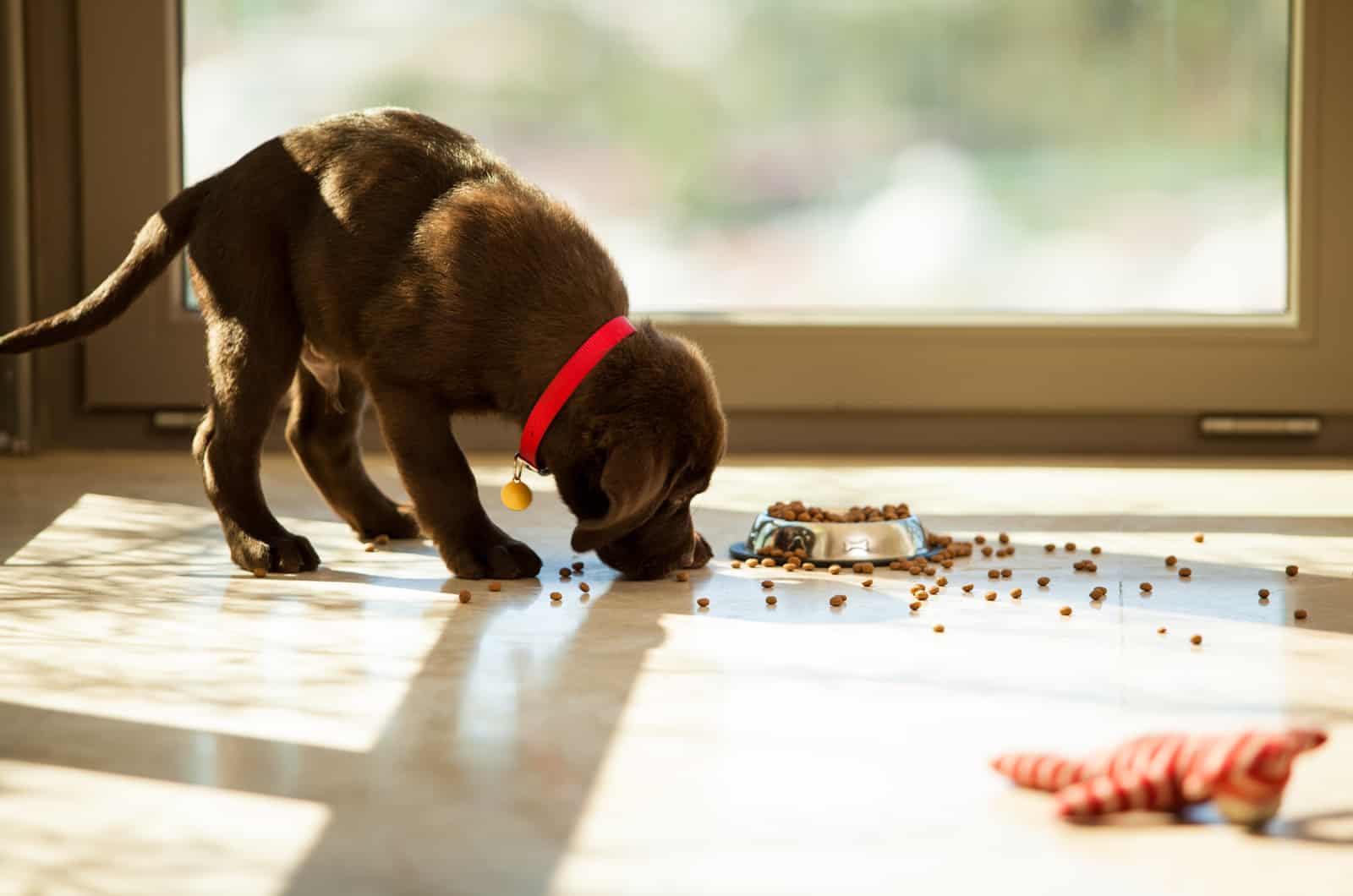
Many pet owners make mistakes when feeding their pets. They do this out of best intentions, as they simply cannot stand the thought of their beloved companion being hungry for a second.
However, if you let your dog develop bad eating habits, you’ll do more harm than good.
Here are some things you should avoid:
Not Having a Feeding Schedule
If you don’t have a feeding schedule, your pup will likely behave as if he is constantly hungry. This is because they’ll develop anxiety out of not knowing when their next meal will be.
Puppies will know exactly when it’s dinner time once you’ve started feeding them on a schedule. However, if they know they’ll get food whenever they ask for it, they’ll never stop begging.
Feeding Dogs Table Scraps
Giving human food and table scraps to your dog is always a terrible idea, especially if you have a growing puppy. This makes it challenging to keep track of what your dog is eating.
Of course, this means your entire family has to be with you on this. If you’re feeding your pooch on a schedule, but your father is giving him table scraps without you knowing, your dog might end up overweight, and you won’t know the reason behind it.
Overfeeding
We cannot stress this enough: overfeeding is the main reason dogs become obese. While chubby puppies might look cute, there is nothing healthy about having an obese dog.
Obesity can lead to many problems, especially in large breeds prone to orthopedic problems such as hip and elbow dysplasia.
My Puppy Is Always Hungry – Can I Prevent Begging?
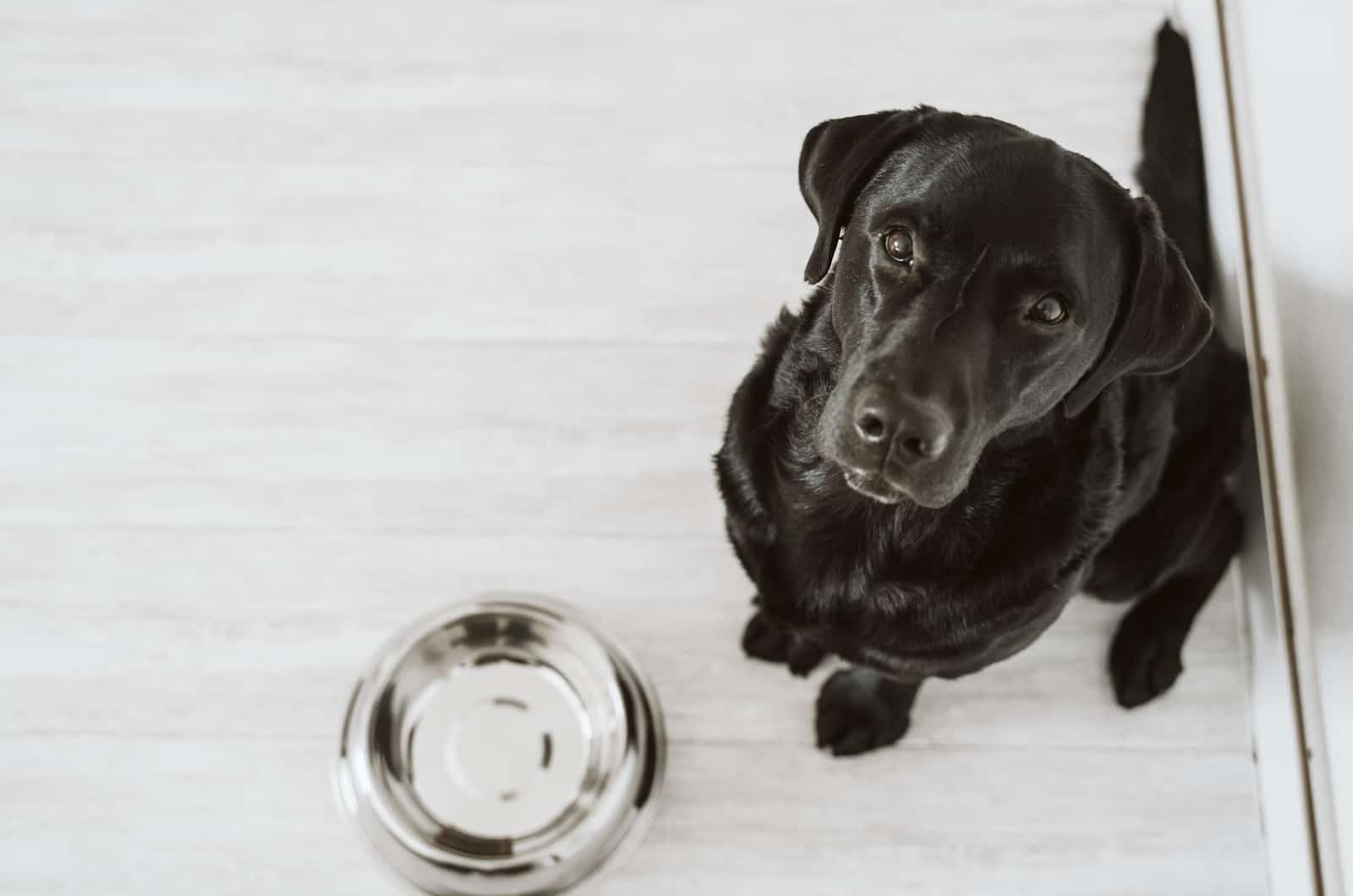
Depending on what’s causing your dog to constantly ask for more food, you might find it easy or challenging to stop this bad habit – and his constant food cravings.
Overall, the best possible thing is to stick to your feeding schedule, no matter the event or the behaviors your dog is expressing. As time goes by, your dog will learn that he’ll only eat when it’s mealtime.
There are a couple of things you might want to try if you want to speed up these efforts:
Give More Frequent Meals
When you bring a new puppy home, you should give him many small meals. As mentioned before, four meals should be enough. This will ease his transition from breastfeeding. As time goes by and your puppy gets used to eating wet food, lower the number of daily meals.
If you suddenly make your puppy eat two meals a day, his body will be in shock, and he’ll have cravings most of the time. This isn’t something you’d want.
Add Water to the Kibble
When a puppy starts eating dry food, he might not be used to it. This can make him eat more or less of it than he should, which will make him hungry all day long.
However, if you add some water to his kibble, you’ll ensure he is hydrated enough. He might even eat slower than he normally would, which will help his tummy feel full.
As he grows older, reduce the amount of water until you leave him with nothing but kibbles. This is the healthiest way to ensure he is eating the right amount of food and that his transition to dry food goes well.
Use Some Type of Obstacle
One of the reasons your puppy might be feeling hungry all the time is that he is eating too fast. The same happens with humans. The faster you eat your food, the more food you’ll think you need.
If you make an obstacle, you’ll make your pup eat slower. This doesn’t have to be something complicated. Adding a cup in the middle of the feeding bowl can be enough. Your puppy will have to eat around it, which will make him eat slower than he normally would.
You can even find many specially designed food bowls made for fast eaters. These can also help prevent bloating or calm down puppies that get overly excited during mealtime.
Consult Your Vet
If you feel like there is something wrong with your puppy and his eating habits, you might want to consult your vet just to be on the safe side.
Unfortunately, there are some medical causes behind the constant hunger some puppies feel. While they are rare, and most of the time, your puppy is simply excited about his food, it isn’t a bad idea to check with a professional. This can help you sleep calmly.
The Final Word
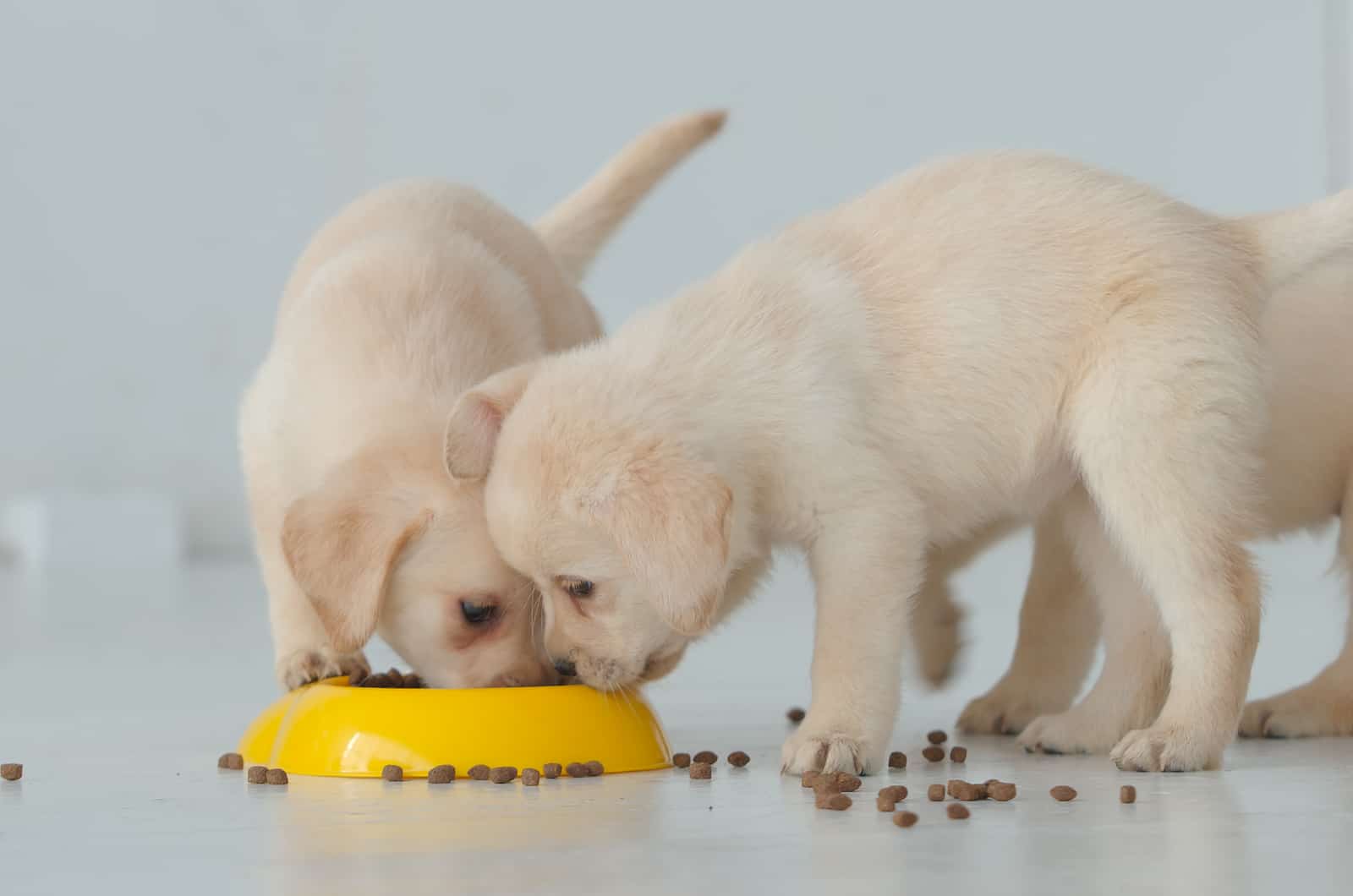
All puppies have unique needs. Before you think, “My puppy is always hungry, am I doing something wrong?” you should take a good look at him. Is he too big or too small for his age? If he isn’t, then the reason is pure bad behavior or instincts.
However, if your puppy seems overweight or underweight, you might want to change the amount of food you’re giving him. Proper nutrition is essential for your dog’s future health.
Fortunately, if you do a bit of research and closely monitor your pup’s weight, you shouldn’t have any problems helping him develop healthy eating habits – and with that, a healthy future.
If your puppy is being annoying and constantly begging for food, the most important thing is to not give in to his begging. Never break the feeding routine, and don’t give him table scraps. This will help him understand that he’ll only eat according to a schedule and not when he begs for long enough.
Finally, there is nothing wrong with consulting a professional behaviorist, especially if your puppy’s behavior has become too challenging to handle.
Read Next: 8 Week Old Puppy Breathing Fast While Sleeping: 10 Causes

